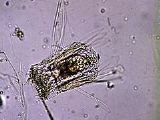
Monogonont
Encyclopedia
The monogononts are a class of rotifer
s, found mostly in freshwater
but also in soil
and marine environments. They include both free-swimming and sessile
forms. Monogononts generally have a reduced corona, and each individual has a single gonad
, which gives the group its name. Males are generally smaller than females, and are produced only during certain times of the year, with females otherwise reproducing through parthenogenesis
.
Rotifer
The rotifers make up a phylum of microscopic and near-microscopic pseudocoelomate animals. They were first described by Rev. John Harris in 1696, and other forms were described by Anton van Leeuwenhoek in 1703...
s, found mostly in freshwater
Freshwater
Fresh water is naturally occurring water on the Earth's surface in ice sheets, ice caps, glaciers, bogs, ponds, lakes, rivers and streams, and underground as groundwater in aquifers and underground streams. Fresh water is generally characterized by having low concentrations of dissolved salts and...
but also in soil
Soil
Soil is a natural body consisting of layers of mineral constituents of variable thicknesses, which differ from the parent materials in their morphological, physical, chemical, and mineralogical characteristics...
and marine environments. They include both free-swimming and sessile
Sessility (zoology)
In zoology, sessility is a characteristic of animals which are not able to move about. They are usually permanently attached to a solid substrate of some kind, such as a part of a plant or dead tree trunk, a rock, or the hull of a ship in the case of barnacles. Corals lay down their own...
forms. Monogononts generally have a reduced corona, and each individual has a single gonad
Gonad
The gonad is the organ that makes gametes. The gonads in males are the testes and the gonads in females are the ovaries. The product, gametes, are haploid germ cells. For example, spermatozoon and egg cells are gametes...
, which gives the group its name. Males are generally smaller than females, and are produced only during certain times of the year, with females otherwise reproducing through parthenogenesis
Parthenogenesis
Parthenogenesis is a form of asexual reproduction found in females, where growth and development of embryos occur without fertilization by a male...
.

